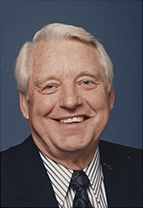Biography
Ronald C. Packard was born and raised in Meridian,Idaho. [1] [2] He attended Meridian High School,Brigham Young University,Portland State University,and University of Oregon Dental School (now the Oregon Health &Science University School of Dentistry),where he received a D.M.D. in 1957. He was in the Navy Dental Corps during 1957–1959,and worked as a dentist after leaving the navy. [3]
Packard first entered politics as a trustee of the Carlsbad Unified School District in California,and served during 1962–1974. He was elected to the Carlsbad City Council in 1976,then elected Mayor of Carlsbad in 1978. While mayor,he was active in community and regional affairs,serving on the transportation policy committee of the League of California Cities,as a Director of North County Transit District,and as President of the Council of Mayors for San Diego County. [4]
1982 election
In 1982,Packard lost the Republican primary for the United States House of Representatives in a crowded field of candidates to Johnnie R. Crean by 92 votes. [5] Crean's character came into issue,with his negative ads and false claim of endorsement by Ronald Reagan,so Packard launched a campaign as a write-in candidate. Packard ran a poll which found that voters would vote for him,especially if they knew how to write him in. Packard campaigned with a gigantic pencil as a prop while giving out golf pencils to district residents. An organized effort among fellow Mormons helped the campaign. Packard won the election by 11,000 votes to become the first independent write-in candidate to defeat candidates of both the Democratic and Republican parties. NPR's Ken Rudin described the race this way:
Eighteen Republicans were running in the primary for the seat being vacated by Rep. Clair Burgener (R). The winner was political novice Johnnie Crean, whose family wealth bankrolled his saturation of the airwaves in the district, situated just north of San Diego. Crean spent well over $750,000 in the primary, then a substantial amount, mostly attacking his fellow Republicans, while ducking candidate forums and personal appearances. Crean defeated Carlsbad Mayor Ron Packard in the primary by 92 votes out of more than 83,000 cast. Furious, Packard announced a write-in effort. Fearful that the GOP split in this overwhelming GOP district could end up electing a Democrat, there was great pressure on Packard to end his bid. But he refused, and won the seat with 37 percent of the vote. The Democrat, Roy "Pat" Archer, finished second with 32 percent; Crean received 31 percent. [6]
Packard was only the third person to be elected to Congress as a write-in candidate, a victory later documented in Campaigns and Elections and due in part to the efforts of Russell Reed Benedict. The two previously successful congressional write-in candidates were U.S. Rep. Joe Skeen (R-New Mexico 2nd District) in 1980 and Sen. Strom Thurmond (R-South Carolina) in 1954. Subsequently, Alaska Republican U.S. Senator Lisa Murkowski lost her party primary in 2010, but waged a successful write-in campaign against Joe Miller, the Republican primary winner and narrowly defeated him in the general election. [7] Upon being sworn in, Packard joined the Republican caucus. He was reelected as a Republican eight times with little opposition in the heavily Republican district.
This page is based on this
Wikipedia article Text is available under the
CC BY-SA 4.0 license; additional terms may apply.
Images, videos and audio are available under their respective licenses.


